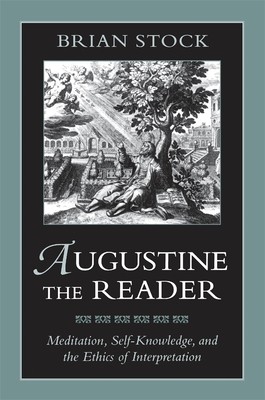
- We will send in 10–14 business days.
- Author: Brian Stock
- Publisher: Belknap Press
- ISBN-10: 0674052773
- ISBN-13: 9780674052772
- Format: 16.2 x 23.4 x 2.5 cm, minkšti viršeliai
- Language: English
- SAVE -10% with code: EXTRA
Reviews
Description
Augustine of Hippo, a central figure in the history of Western thought, is also the author of a theory of reading that has had a profound influence on Western letters from the ages of Petrarch, Montaigne, Luther, and Rousseau to those of Freud and our own time. Brian Stock provides the first full account of this theory within the evolution of Augustine's early dialogues, his Confessions, and his systematic treatises.
Augustine was convinced that words and images play a mediating role in our perceptions of reality. In the union of philosophy, psychology, and literary insights that forms the basis of his theory of reading, the reader emerges as the dominant model of the reflective self. Meditative reading, indeed the meditative act that constitutes reading itself, becomes the portal to inner being. At the same time, Augustine argues that the self-knowledge reading brings is, of necessity, limited, since it is faith rather than interpretive reason that can translate reading into forms of understanding. In making his theory of reading a central concern, Augustine rethinks ancient doctrines about images, memory, emotion, and cognition. In judging what readers gain and do not gain from the sensory and mental understanding of texts, he takes up questions that have reappeared in contemporary thinking. He prefigures, and in a way he teaches us to recognize, our own preoccupations with the phenomenology of reading, the hermeneutics of tradition, and the ethics of interpretation.EXTRA 10 % discount with code: EXTRA
The promotion ends in 21d.17:27:09
The discount code is valid when purchasing from 10 €. Discounts do not stack.
- Author: Brian Stock
- Publisher: Belknap Press
- ISBN-10: 0674052773
- ISBN-13: 9780674052772
- Format: 16.2 x 23.4 x 2.5 cm, minkšti viršeliai
- Language: English English
Augustine of Hippo, a central figure in the history of Western thought, is also the author of a theory of reading that has had a profound influence on Western letters from the ages of Petrarch, Montaigne, Luther, and Rousseau to those of Freud and our own time. Brian Stock provides the first full account of this theory within the evolution of Augustine's early dialogues, his Confessions, and his systematic treatises.
Augustine was convinced that words and images play a mediating role in our perceptions of reality. In the union of philosophy, psychology, and literary insights that forms the basis of his theory of reading, the reader emerges as the dominant model of the reflective self. Meditative reading, indeed the meditative act that constitutes reading itself, becomes the portal to inner being. At the same time, Augustine argues that the self-knowledge reading brings is, of necessity, limited, since it is faith rather than interpretive reason that can translate reading into forms of understanding. In making his theory of reading a central concern, Augustine rethinks ancient doctrines about images, memory, emotion, and cognition. In judging what readers gain and do not gain from the sensory and mental understanding of texts, he takes up questions that have reappeared in contemporary thinking. He prefigures, and in a way he teaches us to recognize, our own preoccupations with the phenomenology of reading, the hermeneutics of tradition, and the ethics of interpretation.

Reviews